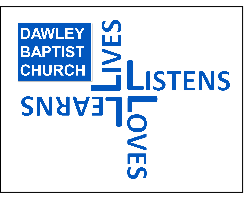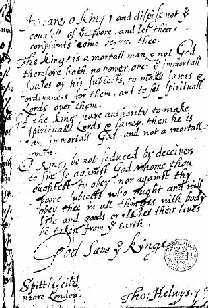
Dawley Baptist Church
Park Road
Dawley Bank
Telford
TF4 2BB

General Enquiries
church.enquiries@dawleybaptist.org.uk
Contact Us





400 years ago, when the bible was becoming available for a wider number of people to read, some Christians became unhappy with the power that the King had. Not only in governing the land, but also governing the way in which people worshipped God. Thomas Helwys began the first Baptist Church in Spittlefield, London. In a bold letter to James I Helwys wrote “The King of England could command what of man he will, and we are to obey it, but, [concerning the church] with this Kingdom, our lord the King hath nothing to do."
This heartfelt request to separate Church from State lead to his imprisonment as a dangerous person intent upon destabilizing the country.
Whilst in prison Helwys died.
Others took up his cause, believing that baptism should be something which happens when a person was at an age able to decide for themselves that following Jesus was their intention, and not have beliefs forced upon them.
A significant number of Christians around the country agreed with Helwys. From the first congregation being formed in London, the Baptist movement spread across the country.
Many persecuted Baptists took the opportunity to escape to America, whose constitution adopted similar principles of separation of church and state, and freedom to believe as conscience dictated. Not surprisingly Baptists were at the forefront of the civil rights movement, and other significant causes where freedom and justice lie at the heart.
Although each Baptist Church, including Dawley’s, has been founded, financed and governed locally, in Britain our churches join in association to pool some of their resources, and to ensure that affluent churches support those operating in more deprived areas. We also ensure that each church holds to our principles.
The beliefs which govern Baptist Churches are set out in a simple form called the
Declaration of Principle
- That our Lord and Saviour Jesus Christ, God manifest in the flesh, is the sole and absolute authority in all matters pertaining to faith and practice, as revealed in the Holy Scriptures, and that each church has liberty, under the guidance of the Holy Spirit, to interpret and administer His laws.
- That Christian Baptism is the immersion in water into the name of the Father, the Son and Holy Spirit, of those who have professed repentance towards God and faith in our Lord Jesus Christ who ‘died for our sins according to the Scriptures; was buried, and rose again on the third day’.
- That it is the duty of every disciple to bear personal witness to the gospel of Jesus Christ, and to take part in the evangelisation of the world.”
The differences which years ago divided us from the established Christian denominations have largely evaporated and we now work closely with our friends in the Anglican, Methodist, Catholic and Free churches, though we are still proud of our principled historic roots.
Further information can be found on the BUGB website under external links.


Baptist Union of Great Britain Website
Baptist Times Newsheet
| Who We Are |
| Leadership |
| Our Mission |
| History |
| Our Partners |
| Who are Baptists |
| Safeguarding |
